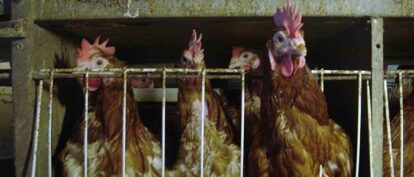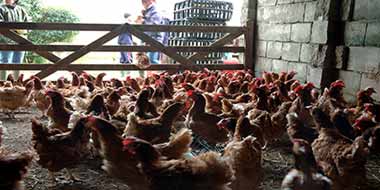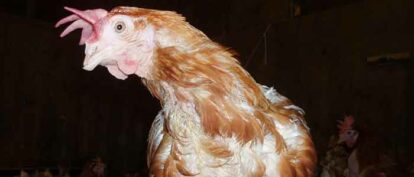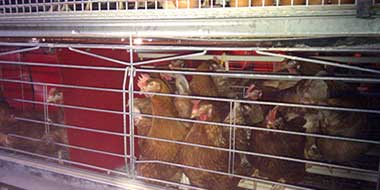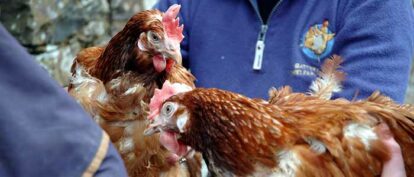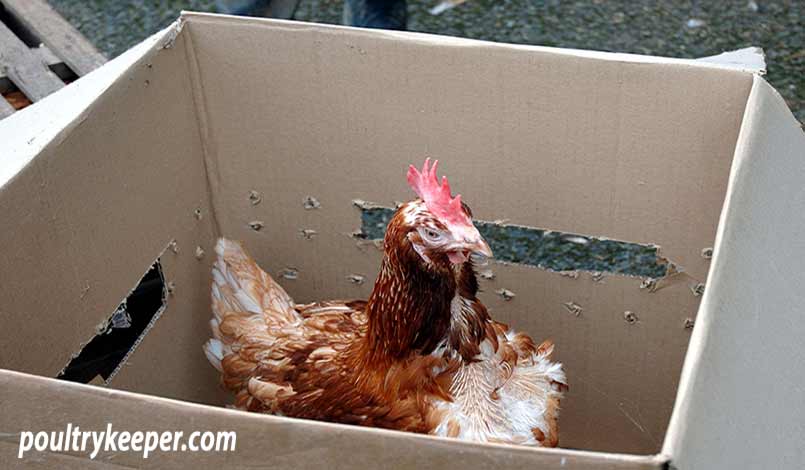
Jo is a self-confessed ex-battery hen addict who adores giving these hens a fresh start in life. In this article, Jo shares her tips on rehoming ex-battery hens so you can learn more about this rewarding and life-enhancing experience.
Ask anyone who already rehomes ex-battery hens or ‘ex-batts’ about their ‘girls’, and you will receive an enthusiastic, and probably very long, animated response extolling the virtues of their ladies.
Whether you are new to keeping chickens or already have a flock of the more ‘normal’ birds, offering a home to some ex-batts is certainly a rewarding and life-enhancing experience.
How to go about rehoming ex-battery hens
There are several battery hen rescue charities in the UK through which you can adopt ex-battery hens. The largest is the British Hen Welfare Trust (BHWT), which rescues some 60,000 hens a year, and have rehomed their 250,000th ex-commercial hen. They have 25 regional coordinators who liaise with local farmers to buy the chickens who would otherwise be destined to become (mostly) pet food.
Once you have made the splendid decision to re-home some girls, contact the coordinator with your details (all hens need to be traceable in the event of a disease outbreak) and the number of hens you require. The minimum is three, but personally, I would go for four or five. Hens are sociable creatures, and should anything happen to one, even two doesn’t really seem enough. The coordinator will then contact you with dates, times and details of the next rescue day.
Rehoming Charities
The Ex-Battery Hens For Sale article contains an up to date list of the re-homing charities and organisations around the UK as well as some tips on finding Ex-Batts.
The big day
Remember that whilst it is a big day for you, it is an even bigger one for your girls. While some hens come from free-range or barn systems (they are still replaced before 18 months), some might be coming from enriched colony cages. For these hens, up until that day, their lives might have consisted of a relatively cramped cage with no natural sunlight. Absolutely everything they encounter from now on will be new and scary!
I have found cat boxes lined with newspaper and straw are a secure, easy way to transport your new girls. Two hens fit into one cat box snugly but are not too cramped. The BHWT usually asks for approximately £5 per bird, although any donation is welcome and covers vet and transport costs and the farmer’s money. Smaller rescue charities can sometimes ask for money upfront.
Personally, I have found taking an extra person along is very helpful as they can sit in the back of the car with the new chickens and keep an eye on them. This stops me from casting furtive glances around every few minutes to check on them. Also, newly freed ex-batts have a dreadful smell, bless them, so open the driver’s window!
Start of a new life
Before rehoming ex-battery hens, there are a few steps to consider. Preparation is the key to making the transition as stress-free for your girls as possible. Caring for ex-batts can seem a little daunting at first, but all they really require is a secure, warm, dry coop, secure run, good food and space to stretch their wings and exhibit all the natural behaviours they were unable to enjoy fully up till now.
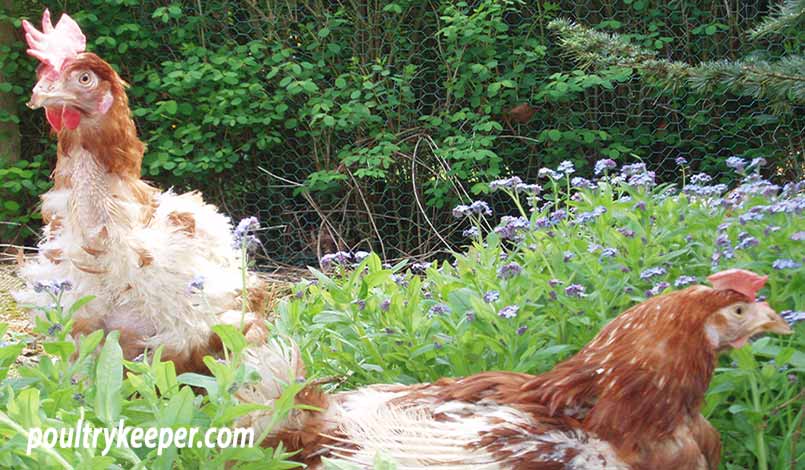
I am most certainly not an expert, just an ex-batt obsessed keeper who adores her hens, but I have picked up quite a few tips on rehoming ex-battery hens and caring for them so far.
Coop and run
It goes without saying that both have to be predator-proof; there would be nothing worse than letting your girls get the first whiff of freedom only for the fox to get them. If you are like me, you will go down the route of more than less when it comes to safety. I have found the catches on bought coops tend to be far too flimsy, so replace them with more sturdy locks and bolts.
Newly freed ex-batts will have no fear and may wander off, so they need to stay in their coop and run until their home is imprinted on them. They do not know night and day, having been exposed to 18 hours of artificial light, so they will need encouragement to go into their coop at dusk. Another reason to keep them confined to their run at first!
Our newest batch had their coop inside our large greenhouse (it was a chilly February when they were re-homed), and they were still dancing around the greenhouse long after dark.
Their legs will be very weak from lack of use, so try to make the ramp less steep by making it longer. Use another piece of wood or even prop it on a sturdy stone if it appears too steep. Or physically put them in the coop each night until they are steadier on their legs.
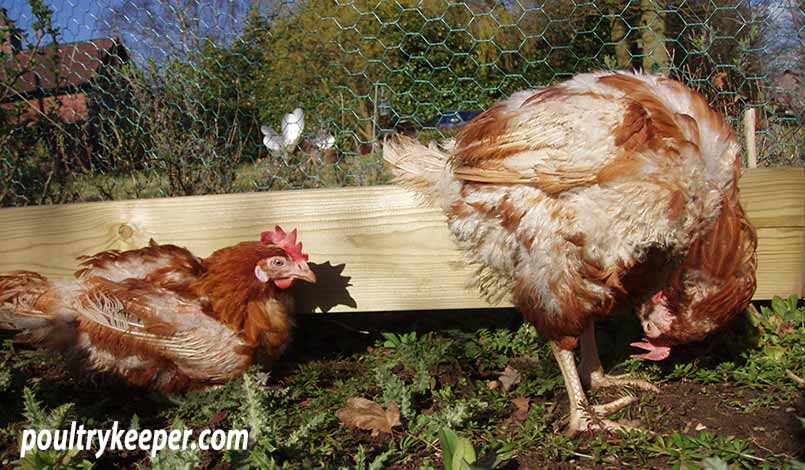
Ex-battery hens have no experience of perching, and at first, it can actually get in the way, so remove it from the coop until their legs are stronger. Once they hop in and out of the coop and nest box, pop it back in as chickens naturally want to perch. That said, none of mine has ever mastered it and tuck up snugly in the nesting boxes together at night!
Your girls will have come from a temperature-controlled environment, so they will need to be kept warm or cool as necessary if they don’t have all of their feathers. Ensure the coop is draught free and bedding is soft, as sore pecked skin needs extra care. Straw can irritate, and one bedding I have found, Easichick, seems to have stopped little Brigit’s sneezes.
Cover part of the run, so they have shelter from the sun and rain. They will obviously be unaware of the weather and will stand out in the rain, oblivious, at first if not protected. Also, naked skin is very delicate and will burn easily, so shade from the sun is just as important.
Food and water
There are several layers-feeds on the market. These are complete feeds that provide all the nutrients the girls need (bar a little teatime treat, of course). While most backyard chicken keepers feed pellets to their hens for convenience, most commercial hens are used to eating crumble. If you would like to feed your ex-batts pellets, buy a small bag and gradually move them across to pellets.
I add poultry spice to the food and a little garlic to give them every chance of recovery. Garlic is great for chickens’ health.
Chickens don’t have teeth, so mixed grit in a bowl (or on the floor if yours kick the bowl over as mine do) will help them digest their food. Oyster shells provide extra calcium as ex-batts can be prone to laying soft-shelled eggs.
I have read great things about putting apple cider vinegar in the water on this site and agree wholeheartedly with them! It boosts the immune system, which helps the chickens from falling foul of any diseases, it keeps worms at bay (although it does not prevent them), and my girls seem to like the taste!
Pecking order
Your little chickens have had a hellish ride through life so far, and the odds are that the fewer feathers they have, the more hellish that ride was. So introducing them all to each other will be quite a trauma for them.
They will naturally establish a pecking order, but this can seem quite a brutal process, and human intervention can sometimes prolong it. There are a few things though that you can do to help it along: Pop them all in the coop together when they are asleep so that they wake up together.
We had one chicken, Bella, who was the very devil that first night. She had to be separated from the others to sleep in a cat box, and we put her in the coop later that night, once they were all asleep. The next day there were minor scuffles but nothing too dramatic. Bella is now top chicken and very protective of her ‘girls.’
Chickens are attracted by blood, so you want to avoid that if at all possible. Please make sure there are plenty of feeders and drinkers around, so the dominant hen doesn’t hog them. Hand up some tasty greens for them to peck at. Invest in some anti-peck spray!
Free-ranging
The reason for rehoming ex-battery hens is not for the eggs but to provide a happy retirement to some hard-working ladies. The burning question, though, is how far do we let them roam?
Half of me wants them to be in the run and completely safe from predators, whilst the other half thinks they have spent long enough in a confined space; they need the freedom to roam!
Foxes are everywhere, and no matter how hard you try, I don’t think anything is 100% fox proof. So I decided to let my girls free range in my secure garden during daylight hours.
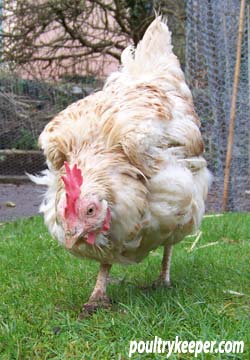
I introduced it gradually as a big garden can seem quite daunting to a little hen. Now, they have breakfast in their run, trash my garden during the day, and are locked up again well before dusk.
Ex-batts and other animals
Don’t be fooled by their frail stature, ex-batts are very capable of looking after themselves when faced with a family cat. My five cats are all terrified of the chickens and slink past them, Audrey chicken thoroughly enjoys a game of ‘chase the cat!’ I would however, take much more time introducing a family dog to the chickens and never have him/her off lead in the garden until you are completely sure of their reactions. I have included children in this section as well!
Rehoming ex-battery hens can be the most amazing educator for children (and adults). Children become aware of where their food comes from – collecting eggs is a great treat – and they feel the benefits of caring for another creature. It also highlights the evils of intensive farming in their minds, children are the future after all.
Health
Contrary to appearance, ex-batts are not unhealthy; they are merely unfit. They have had the full quota of vaccinations whilst on the farm and checked over on rescue day. However, standing in a cage 24/7 means their legs are weak, and they are unused to exercise, so introduce it gradually.
Occasionally, however, a hen cannot cope with the transition from cage to coop; it is simply too traumatic for her. This is a desperate shame for the little hen who will only know life in a cage and never be aware of the free-range happiness you had waiting for her.
The BHWT careline (01362 822904) is a wonderful helpline for people rehoming ex-battery hens and offers great advice on all aspects, no matter how small. Finding a good vet, who has experience with chickens as pets and not just livestock, is also essential.
Rehoming ex-battery hens have been one of the best things I have ever done. Sometimes I think it is not me that has done the rescuing; the little chickens have rescued me. I can guarantee that if you do re-home some ex-batts within days, it will be you giving that enthusiastic, animated response extolling their virtues!

